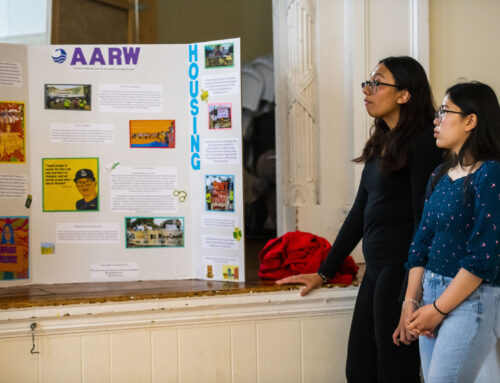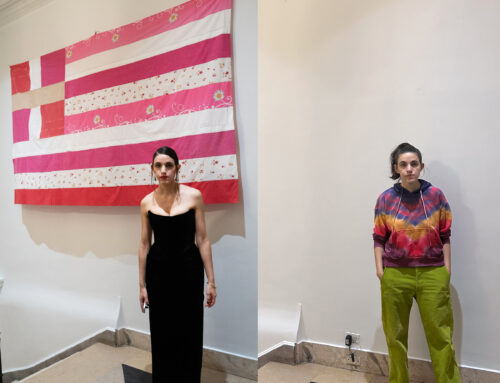It was obvious the gift-wrapping attendant at Borsheims was irritable when we approached the counter. My mother and I had just purchased some picture frames for my father and grandfather for Father’s Day that weekend. We joined two other mask-clad patrons waiting for their gift wrap sets. The woman appeared behind the counter, eyeglasses perched on her coiffed hair, order tickets in hand.
“What’s the name?” she asked the group.
The woman in front promptly responded, “Jensen” while the man in second replied, “Johnson” with a chuckle at the similarity.
Then, it was time for us to give our name. It would’ve been much simpler if we could’ve responded with Jones.
“Luzarraga.”
The attendant scoffed and muttered to herself, obviously inconvenienced, disappearing into the back room to retrieve our kit. Icy bitterness sluiced through my veins, along with a slight flush of shame. These encounters are nothing new for me and many others with names considered uncommon to an American accustomed to solely English.
My name has always been something I’m hesitant to share with others. Certain adolescent experiences stick out in memory.
I was sitting on the rug the first day of kindergarten, waiting for the beach ball to be passed to me, so I could say my name. My tiny hands became clammy as I caught the ball, setting my gaze firmly on the carpet as I whispered my name, Isa Luzarraga (ee-suh/lou-zar-a-guh).
Most often there would be some laughs, the teacher moving on to the next student. For a while, I contemplated going by Bella, something that would spare me the embarrassment I always felt, as if it was my fault someone couldn’t pronounce ‘Isa.’
With the racial and cultural tensions present in the U.S., respect for others’ differences has never been more important, especially when it comes to creating safe spaces for youth in education. Reporter for the Washington Post, Joyce E. A. Russell, explains the integral role names play in our identities.
“A person’s name is the greatest connection to their own identity and individuality,” Russell said. “People want to be treated as human beings, not objects. Using their name is the fastest and most reliable way of building rapport.”
For me, my name is connected to my cultural identity, and it is a representation of my Cuban culture and the sacrifices my family made to escape an oppressive government. My first name, Isabella, is an abbreviation of the phrase ‘beautiful island’ in Spanish while my last name, Luzarraga, means ‘place of ash trees,’ referencing the topography of the Basque region.
A few mispronunciations are natural when people initially meet someone. A problem arises when people cease to correct themselves or even avoid addressing a person to hide their uncertainty. It makes it seem like the individual is not worth getting to know or the history behind their name is insignificant. Throughout my freshman and junior years in high school, I had teachers mispronounce my name and/or never address me by my name during the entirety of class, no matter how often I attempted to correct them. I am not alone in the struggle to feel valued through my name.
Rising freshman at the University of Nebraska at Lincoln, Janana Khattak (jah-nah-nuh/kah-talk), is no stranger to feeling lonely because of her name. While her name in Arabic translates to ‘beloved,’ Janana felt less than valued during her 13 years of education in predominantly white classrooms.
“I understand no one can be perfect, and it’s unrealistic people immediately get your name right,” Janana said. “However if one continues to mispronounce your name, it is a show of their willful ignorance. Having an ethnic name, continued mispronunciation is a microaggression that denies a part of who I am. If someone can’t take the time to get my name right, they surely do not intend on getting to know me as a whole person.”
Junior at Presentation High School in San Jose, CA, Meghana Nagendra (meh-gah-nuh/nuh-gen-drah) feels education regarding name-based microaggressions is the most effective method to make learning environments more inclusive.
“When someone repeatedly mispronounces my name, it makes me feel like I need to conform to the pressure of shortening or making it easier to say for the people around me,” Meghana said.
Despite their feelings of singularity, Janana and Meghana said they’ve begun to value the history their names represent.
Meghana takes pride in the Sanskrit meaning of her name, which translates to rain cloud, and Janana feels more connected to her family through her name.
“One of the most important moments for me to appreciate my culture and heritage was learning the story of how my name came to be,” Janana said. “It was after school one day when my grandmother and I spoke in our casual conversation. I realized my place in the long line of powerful women.”
It’s important to realize that no one is asking you to be perfect. Simply be mindful of how much power your words and occasional mispronunciations have on others and how they see themselves. I’ve embraced my name, and a second visit with the gift-wrap attendant won’t phase me.
I’ll march straight up to the counter with a genuine smile and say, “I have gift wrap to pick up. My name is Isa Luzarraga.”




Congratulations Isa, so enjoyed reading your article, it’s written by experience you can tell.
So proud of you, thanks for bringing this to light.
You’re a beautiful and awesome young lady. Thank you.